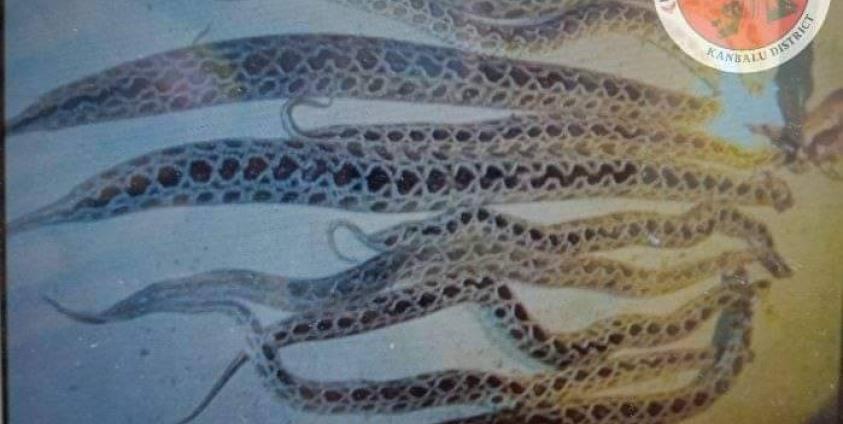Following the coup d'état, Kanbalu District in Sagaing Division experienced a significant rise in venomous snakebite cases, with 80 reported victims and 6 fatalities. An official from the Kyunhla-Kanbalu activists group highlighted the urgent need for antivenom supplies to effectively treat these snakebite incidents.
In the first two weeks of June, internally displaced persons (IDPs) in Kanbalu District, Sagaing Division, experienced an average of one snakebite per day. The victims, ranging in age from 8 to 61 years old, faced these incidents.
An official from the Kyunhla-Kanbalu activists group mentioned, "To the best of my knowledge, I cannot confirm whether the media has made contact with the patient who suffered a snakebite. However, the incidence of snakebite victims is alarmingly high in Kanbalu district. In Sagaing region, apart from Kanbalu district, there are very few cases of snakebite victims. The prevalence of snakebite patients is not as significant in any other district compared to Kanbalu district."
According to the Kyunhla-Kanbalu activists group, the people residing in Koetaungboet, Chatthin, and Pintthar villages in Kanbalu district have been forced to flee into the forest to escape the ongoing conflict. The Military Council troops and Pyu Saw Htee militias have reportedly burned down villages, resulting in a significant influx of internally displaced persons (IDPs) in May, with an estimated count of 50,000 individuals.
The Kyunhla-Kanbalu activists group official also highlighted that vipers and cobras are the most commonly found snakes in the area. As a result, there is an urgent requirement for skilled doctors and necessary medicines to provide proper treatment for snakebite victims.
"Speaking honestly, there is currently no doctor available. We have community health workers participating in the Civil Disobedience Movement (CDM), but they lack the expertise to treat snakebite patients. It is challenging to provide medical care without the presence of a qualified doctor. Moreover, there is a scarcity of medicines. With an average of one snakebite case per day, there is a dire need for adequate supplies of medicine," he expressed.
Over the course of three consecutive days, snakebite incidents were reported in Kanbalu district. On June 18, a 47-year-old woman and a 28-year-old man were bitten by snakes. The following day, a 50-year-old man experienced a snakebite, and on June 20, a 30-year-old woman was also bitten.
According to a person assisting IDPs in the Kyunhla-Kanbalu region, the incidence of snakebites is on the rise, necessitating the availability of snake antivenom (BPI). In the event of a snakebite, it is common practice to administer up to four injections of snake antivenom (BPI) to the patient.
"With the rising number of snakebite incidents in these districts, I appeal to the community to assist one another in this critical situation. I am hopeful that we will receive medicine allocations from the health department under the National Unity Government (NUG). I am aware that we received them in previous months," he said.
In the first two weeks of June 2023, there were 11 snakebite victims, comprising 6 men and 5 women.
The snakebite victims were part of the more than 50,000 IDPs who were forced to flee into the forest due to the acts of arson committed by the Military Council troops and Pyu Saw Htee militias in Kyunhla, Kanbalu district in May.
The residents of the Kyunhla-Kanbalu region are suffering from the effects of fires, conflict, and the actions of the military council troops. They face shootings, arrests, beatings, and the burning of their villages. The continuous firing of artillery shells and small arms further endangers their lives. Moreover, they are currently dealing with the added danger of venomous snakes, adding to the already difficult circumstances they face.







